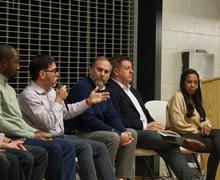Middle Eastern Festival to celebrate 90th anniversary this July
Courtesy of Lina Abu-Manneh
The Middle Eastern will take place at St. Elias Antiochian Orthodox Church from July 11-14.
What once was a small picnic hosted by St. Elias Antiochian Orthodox Church is now a four-day Middle Eastern festival, aimed to embrace and share the culture.
St. Elias Antiochian Orthodox Church will host its 90th annual Middle Eastern Festival July 11-14. Kathy Fedrizzi, whose grandfather and great-grandfather were among the founding members of the church said that the festival will include music, dancing and a food vendors market.
“It’s something different to do in our community,” Fedrizzi said. “It gives (locals) that opportunity to try foods that they might not necessarily be able to try anywhere else.”
She said a lot has changed since the first festivals, originally just a small picnic for members of the church. Since Ramzi Khairallah assumed the role as festival chair in 2015, his emphasis on food quality has proved to bring not only more authenticity to the festival, but also a boost in annual attendance.

The festival menu includes falafel along with daily specialty dishes. Courtesy of Lina Abu-Manneh
Originally from Lebanon, Khairallah was able to use his upbringing to revamp the festival and increase its efficiency, most notably with the food, he said. Pita bread is a staple in many Middle Eastern foods and is used at the festival for sandwiches. Sandwich-making is a lengthy process, so Khairallah uses panini presses to toast the sandwiches – a trick he picked up from the deli owners in his home state.
This year’s festival will also include daily specialty dishes which, Khairallah said, are meant to spotlight foods deriving from one particular country or region.
Thursday’s specialty dish is Musakhan, a chicken dish baked with caramelized onions and sumac spice. It’s a Palestinian staple, Khairallah said. Friday and Saturday’s dishes are Lahm Bi Ajeen, which is a meat pie, and kafta, a street dish similar to a meatloaf decorated with parsley and onions. Sunday’s specialty is an “East meets West” fusion cuisine. A shish kebab with encrusted za’atar – a stand-alone ingredient that many in the Middle East dip their bread in.
In addition to the food, the festival’s roots can be felt through its entertainment. Live music from singer Jad Rahme will be performed along with the dances from the church’s dabkeh troupe. Dabkeh is a cultural Levantine dance similar to line dance with intricate stepping, said Abeer Tadrus, a choreographer for the dance troupe.
Tadrus has taught dabkeh for more than 12 years and has been involved with the church for more than 20. Through the years, she has seen how the festival continues to grow, inspiring the dance team to improve each year, she said.
While dabkeh is based on traditional movements, the music danced along dabkeh can be as current as today, said Tadrus. This year, the team will dance to music popular during Tadrus’ great great grandma’s lifetime, along with a song that debuted last year.
While dancing helps students learn how to become team players, the importance of learning the dance stems back to why there is a festival in the first place: to preserve and grow their heritage.
“They’re so proud in their culture and proud in what they are sharing, and I think that the biggest message: to shine positivity, light and education on our culture,” Tadrus said. “And we want to share that with everybody.”
Published on July 3, 2019 at 11:12 am
Contact Diana: dianar@dailyorange.com





